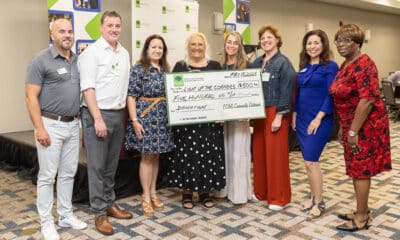Business
Peachtree Corner’s ControlRad is Making Radiation Safe for Medical Staff [Podcast]
Published
5 years agoon
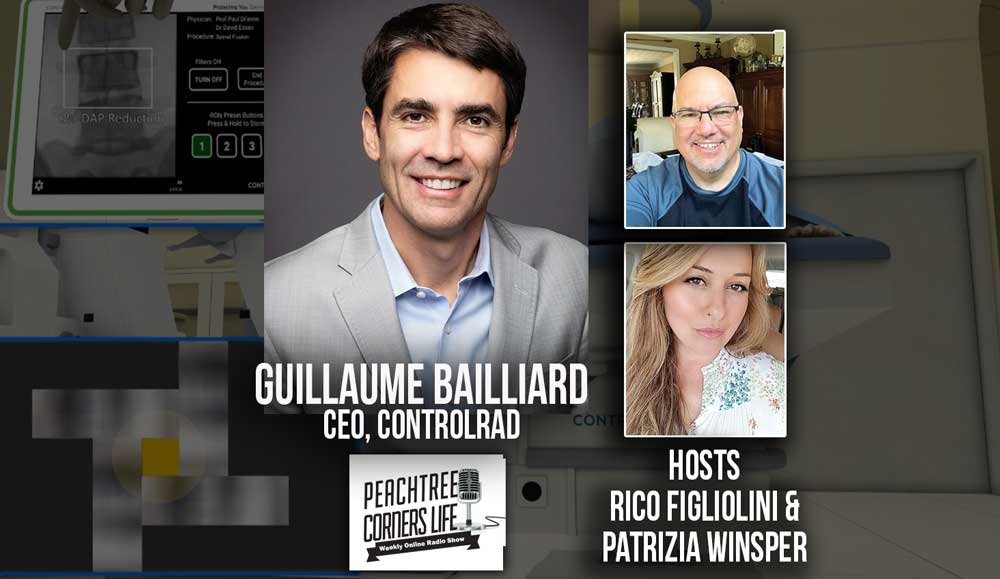
More than ever before is the general public concerned for the health and safety for the brave
men and women in our medical and healthcare system. ControlRad and CEO Guillaume
Bailliard, our guest on today’s episode, have developed special medical technology to protect
both medical staff and patients from excess radiation. Join Rico Figliolini, Patrizia Winsper, and Guillaume as they discuss the inner workings of this amazing and life-saving technology.
Resources:
Website: https://www.controlrad.com
“The way our device works is… that we add an accessory to existing x-ray units that is a semi-transparent filter… that moves in real time… depending on what the physician needs to see on the screen. So we’re able to radically and dramatically reduce radiation, unnecessary radiation to both patients and medical staff using our device.”
Guillaume Bailliard
Timestamp:
[00:00:30] – Intro
[00:03:13] – ControlRad’s Device
[00:07:48] – Input Devices
[00:09:25] – Using Existing Technology
[00:10:23] – ControlRad’s Consumers
[00:12:19] – Consolidation
[00:13:42] – Other New Products
[00:14:27] – ALARA
[00:16:14] – Repercussions of Radiation
[00:18:57] – Case Studies
[00:20:42] – Time in Development
[00:22:02] – Moving to Peachtree Corners
[00:24:08] – Effects of COVID-19 on ControlRad
[00:28:29] – Closing
Podcast transcript
Rico: [00:00:30] Hi everyone. This is Rico Figliolini, host of the Peachtree Corners Life. Glad that you’re joining up, whether it’s live from on this feed with Facebook or you’re joining us on our podcast or YouTube video. I would appreciate it if you follow us online, currently if you like Facebook page for Peachtree Corners Life, you get notification of our live stream so that’d be great to do. Before we get to our today’s show, great guest to follow up to a cover story that we did an issue back about vibrant technology in the heart of Peachtree Corners. I just want to introduce our sponsor for the family of podcasts we do, which is Hargray Fiber. Hargray Fiber is a company that deals in fiber optic cable, communications, IT management, bundle services, throughout the Southeast. They’re in our communities. They’re doing great work in our communities too, especially now reaching out, providing free internet services per company, doubling bandwidths for existing customers. They’re doing a lot of things out there to make teleworking way easier. To find out more about them check them out HargrayFiber.com. We appreciate their sponsorship. So now let’s join with my cohost Patrizia Winsper, who wrote the article on these technology companies and today’s guest, she’s going to introduce him. I’m going to pick them on screen right now, Patrizia go ahead and introduce our guest today.
Patrizia: [00:01:51] Good afternoon, everyone. I have the sincere pleasure of introducing to you, CEO of ControlRad Guillaume Bailliard. Hi Guillaume.
Guillaume: [00:02:02] Hi everyone. Thanks for having me on.
Patrizia: [00:02:05] How are you doing today Guillaume?
Guillaume: [00:02:07] Doing fantastic. It’s a beautiful day outside.
Patrizia: [00:02:10] Awesome. It’s such a great time to do a podcast about some positive news and some great innovations that are taking place right here in Peachtree Corners. So I hope everyone has a chance to just settle down with us for a little bit and think happy thoughts and listen to some good news that’s going on. Right Rico?
Rico: [00:02:27] Yes, absolutely. Our guest is actually in the city of Peachtree Corners and he’s at his office at Tech Park. Right Guillaume?
Guillaume: [00:02:39] That’s right. I’m here in Peachtree Corners at the office on Scientific Drive, absolutely. So we are, today we’re doing some testing inside the, our laboratory here in the office. So we’re here to support and review the testing.
Rico: [00:02:55] For sure you’re doing this socially safe and all that, I imagine, right?
Guillaume: [00:02:59] I am. I did take off my 95 mask that I have with me here, but I took it off here for this interview.
Rico: [00:03:05] Excellent. Good. So let’s, let’s get right down to it then. Why don’t we ask, Patrizia did you want to show the magazine?
Patrizia: [00:03:13] Just wanted to point out that this is a story that appeared on the cover of our February, March, 2020 issue. And ControlRad is being featured today in this podcast, and of course that’s Guillaume Bailliard, CEO. Now if we’re looking at the name of your company, Guillaume, ControlRad, let’s think control radiation. This company has come up with a medical device that actually helps the medical professionals. Who are doing these procedures on a daily basis and protecting them or controlling that excess radiation that is unnecessary and that is currently inevitable without your device. So let’s talk about ControlRad’s medical device and exactly how is it that you are performing these procedures sparing both surgeons and patients, the exposure to that unnecessary scatter radiation.
Guillaume: [00:04:16] Okay, great. Yeah, so what people, you know, through this COVID-19 pandemic are now more appreciating than ever is that medical professionals put their lives at risk for treating patients. And our technology helps radically and dramatically reduce the life altering risks associated with radiation exposure to the medical staff. So as an example, when you’re getting, let’s say, a stent deployed in your heart to open up a blockage. A cardiologist will use a cath lab, which is a x-ray unit that continuously deploys x-ray to see inside your body to deploy that stent. The patient gets radiated one time, but the medical staff, the physician and the nurses and everybody else in the room will get radiated their entire lives as they do multiple of these procedures per day and throughout the year. A typical cardiologist will get exposed the equivalent of 150,000 chest X-rays throughout their lifetime. So it’s very similar to the NFL concussion story where we knew these risks were there for a long time. It took a couple of key cases for that, for this to surface as an issue, and we’ve deployed a technology to help reduce that risk. And the risks are dramatic. There is two times the risk of left brain tumors. There’s a 50% increase in incidents in cataracts. There’s a 34% increase in stroke incidents when compared to other physicians that are not in the x-ray room. So both patients and medical staff are, get dramatic, dramatically less radiation using our device. And that’s how, and basically the way our device works is, I think to answer your question Patrizia, is that we add an accessory to existing x-ray units that is a semi-transparent filter. Thank you for showing the image that moves in real time based on where the physician needs to, what, depending on where the physician needs to see on the screen. So we’re able to radically and dramatically reduce radiation, unnecessary radiation to both patients and medical staff using our device.
Patrizia: [00:06:34] So your filter is situated under the patients?
Guillaume: [00:06:38] That’s correct. The filter is under the patient right above the tube. The x-ray tube that hits the patient. I think you’ve got to move it over just a little, right there where the extra tube shoots through the patient we retrofit and add our filters to existing x-ray units. Which is a bonus for administrators because you don’t have to go out and buy a brand new x-ray unit or a brand new cath lab unit. We can retrofit your existing cath lab or your existing C-arm.
Patrizia: [00:07:10] So your device is retrofitted on the machine right here.
Guillaume: [00:07:13] That’s correct.
Patrizia: [00:07:14] And then let’s talk about this.
Guillaume: [00:07:18] And that is a tablet and the tablet, this is placed next to the patient where the physician is and the physician can select on the tablet and basically draw a region of interest to move the filter in the right location. So basically what you have is you have a tablet that is the input device, and then you have filters that are moved based on where the physician is looking on the patient.
Patrizia: [00:07:48] Now Guillaume, I realize you deal with this every day, but to mere mortals like Rico and I and probably the general public, it’s quite fascinating how the physician is able to select the region of interest, both with just his eyes. Is it special glasses that he wears for the computer to sense where he’s looking?
Guillaume: [00:08:08] Right. There are two types of input devices. One is an eye tracker, which is a device that is actually next to the monitor. No glasses are needed or we use a tablet, so both are devices and input devices that are used to help move those filters. The device that we’re using for the first system that we rolled out. Earlier this year is using a tablet.
Patrizia: [00:08:33] Okay.
Rico: [00:08:34] Okay. Wow, that sounds a bit almost Sci-fi. It almost feels like Star Trek or something.
Patrizia: [00:08:40] It really sounds super futuristic.
Rico: [00:08:42] Right? I mean, you know if I can wear those glasses and it follows where I want to put it. That’s the ultimate thing, right? I mean, even augmented reality, I could see you probably even advancing it further where the information will be right on the glass like that at some point.
Guillaume: [00:08:57] Eventually there, certainly eye tracker technology has, has an unlimited amount of potential and you know, currently they’re being deployed in actually laptops as a standard feature. Certainly the gaming world has helped advance the, the amount of funding in the eye tracking technology. And we’ve basically taken an off the shelf eye tracking technology, and are able to retrofit it with our device and use it as one of the input devices that we use.
Rico: [00:09:25] You know, what I like about it is that you’re dealing with an industry where the equipment is so expensive. And it’s almost legacy in some ways because even the operating
systems and some of the old systems, they might be based on windows, windows seven even as far back. And you are giving them an option to just augment existing equipment they have.
Guillaume: [00:09:47] That is a key point. And our ability to retrofit existing x-ray units is important. A cath lab, which is used for the procedure I was describing earlier, to help deploy stents. Can be $1 million or more. So if you wanted this feature to radically, dramatically reduce your risks of all these adverse events that I talked about, an administrator, a hospital may have a really tough time looking for capital to acquire another cath lab, it could cost $1 million. But if you’re able to retrofit your existing, your existing C-arm, then that is a massive benefit. So that is definitely a key feature.
Rico: [00:10:23] So the, the type of customers are you looking at are major hospitals, small local clinic? Or where’s your sweet spot as far as customers and industries?
Guillaume: [00:10:33] All of the above. So there are, there are more than 20,000 mobile C-arms in the US and those are used in hospitals for surgeries, spine trauma. They’re used by cardiologists. They’re also used by pain management facilities in outpatient facilities. They’re also used in ASCs, ambulatory surgical centers. So these mobile C-arms are deployed all over the place, in outpatient facilities and in hospitals. So anybody who is using x-ray to look inside the body without cutting it open essentially, could potentially benefit from our technology. To be clear, this is for fluoroscopic systems or C-arms. So this is not for dental equipment or plain x-ray. If I broke my arm and I go to an urgent care center where you’re taking one single exposure, the medical staff is not in the room during that exposure and the patient gets a very low amount of x-ray, a single time. This is for continuous x-ray in deployment of, let’s say stents, or let’s say in a pain management facility.
Patrizia: [00:11:48] We’re looking at physicians like urologists, cardiologists. Who else might deploy?
Guillaume: [00:11:56] Interventional radiologists, cardiologists, spine surgeons, pain management, gastroenterologists, pulmonologists that are using scopes to take biopsies inside the lung. I think you mentioned urologist, vascular surgeons. There’s, there’s seven to eight specialties that use mobile C-arms or fixed cath labs to see inside of body deploy devices.
Rico: [00:12:19] You know, I’ve found that a lot of the hospitals like Northside hospital and a lot of these major, larger facilities, companies are buying up smaller places. They’re setting up outreach satellite offices, essentially almost like a contractor based. Where they bring in the specialists into, they build a hub, provide all the machinery and then the specialists come and they rent space essentially is what they’re doing. Is that a good, I mean, how are you seeing that industry responding to what you want to do, what you’re providing?
Guillaume: [00:12:52] Yeah, that’s, that’s definitely, the consolidation in the healthcare system is certainly something that’s happening. As you get more buying power as a hospital and you
acquire competitors, let’s say I’m an ambulatories, an ASC and employee surgical center, or I have my own outpatient facility as a physician, but I’m not part of the hospital. Certainly consolidation is a trend in, in many markets. There’s pros and cons in consolidation. Us hospitals tend to have more buying power. I’m a big fan of, of competition, but at the same time, consolidation can help provide better care. So there’s, there’s pros and cons to those models. It’s not going to really impact us, our business, but certainly a trend is, is a, that’s a true trend that we’re seeing nationwide.
Rico: [00:13:42] Okay. You have two other products coming out? You mentioned that before we got on. Are they things you could talk about?
Guillaume: [00:13:49] Yeah, so the first device has been FDA cleared, and we’re currently selling today, and that’s retrofitting mobile C-arms. Mobile C-arms. Are smaller C-arms that are used by all the specialties I talked about. The next device that we will be releasing in the second half. We’re in preparation or preparing our submission is for fixed arms or cath labs. So it’s the same device. It’s just on a separate markets within the healthcare space.
Rico: [00:14:24] Okay.
Patrizia: [00:14:27] Guillaume let’s talk about Alara. It’s the FDA’s guiding principle of radiation safety. So Alara stands for?
Guillaume: [00:14:38] As low as reasonably achievable. And Alara, the objective of Alara is any amount of x-ray, is considered not good. So if you can get it as low as you can while not impacting the ability of the physician to provide the care that he or she needs to provide, then that is a, that is a good place to be. So the key, the key component of our device is that we’re able to reduce radiation without impacting image quality, negatively impacting image quality. Historically, a lot of people have struggled. At reducing the radiation exposure to the physician and medical staff. But it has come at a cost and that cost typically has been lower image quality. And when you lower image quality, you lower the opportunity of providing the best possible care you can. So Alara is that principle that the FDA and many other societies follow which is, let’s get x-ray radiation as low as we can without impacting outcome
Patrizia: [00:15:45] And let’s talk about ControlRad and how far they are able to reduce that level of radiation exposure.
Guillaume: [00:15:52] So in our FDA submission, we would do anywhere between 50 to 89% the radiation exposure to both patients and the entire medical staff inside the room. That is considered game changing.
Patrizia: [00:16:08] That is considered game changing
Guillaume: [00:16:10] Especially when you don’t negatively impact image quality.
Patrizia: [00:16:14] You talked to us earlier about some of the negative repercussions from the physicians who are continuously bombarded with this scattered radiation and you mentioned brain tumors, on which side of the head were they more likely to?
Guillaume: [00:16:26] Left sided brain tumor. So they have two times incremental risk of brain cancer compared to other medical professionals, and they have an increasing incidence in left brain. Why is left brain relevant? When the physician is at the patient they’re on the left side of the patient and it’s their left side of the brain that is closest to the x-ray tube. So there’s a direct correlation with exposure from the x-ray tube to brain tumors. So that is why the left brain tumor is a very meaningful.
Patrizia: [00:17:02] And the last time I had spoken to you at your office when it was still safe to be side by side and have an actual conversation with someone in person. You did mention there was at least one study out that indicated that your image quality. was not only not affected adversely, but improved for the physician that was testing the product. Have you had any other such tests or results from other physicians?
Guillaume: [00:17:27] That’s right. So we, we in our, in our first installations at the beginning of the year, the feedback has been, well, not only are you not negatively impacting image quality, but your image quality has actually gone up. We’ve actually improved image quality. And we thought this was going to be the case from bench testing, lab testing that we had done. But we didn’t really appreciate how clinically meaningful it was. And the feedback from this position was you have improved image quality to the point that you’re able to reduce the operating time. Cause if I can see what I need to see better and faster than I can actually reduce my operating time. If you could reduce operating time and time where you’re sedated, the cost of the OR and the advantages to the patient are very meaningful and very clinically important. So when we were out to reduce radiation and what we have found when we launched the technology is not only did we reduce radiation, but we actually clinically improved image quality. That is not part of our FDA label, in our FDA claims. But now we’re going to be, we’re going to look to further do additional testing to be able to provide that claim that and investigate if we can get that claim from the FDA. But very important outcome from these initial installs.
Patrizia: [00:18:54] Absolutely.
Rico: [00:18:57] So do you, do you have several clients that you’ve been selling to? Can you talk of any case studies right now, Guillaume, of successes that you’d like to mention?
Guillaume: [00:19:08] Yeah, so we have installations in surgical fields. We also have it in outpatient facilities. By pain management in a pain management field. And the utilization and the reductions and radiation that we’re seeing are matching what we claimed we were able to do. And we’re very pleased with that and we’re getting additional outcomes like Patrizia just
pointed out regarding image quality. So we’re very pleased with the outcomes, both in being able to deliver a very high radiation reduction and then provide better image quality.
Rico: [00:19:48] Do you have, what are you looking forward to? What developments are you, beyond the two products you’re working on, you know, long range. Do you have long range plans that you’d like to be doing in this field as well?
Guillaume: [00:20:01] Yeah. So in the next iterations we’ll be looking at further developing for other types of C-arms. So there’s a whole host of different types of C-arms and x-ray equipment. So we’ve launched it with a mobile C-arm, a GE mobile C-arm. We’re going to be doing it with a fix C-arm cath lab at the, at the risk of prying too much information is going to be on it fixed CRM with a Siemens, another vendor. And we’re in talks with all vendors and we’re getting interest from a lot of different parties and are looking to collaborate more with some of these C-arm OEMs to further expand the reach of our technology.
Rico: [00:20:42] How long have you guys been in business?
Guillaume: [00:20:46] Well, we’ve, the technology was originally launched in 2010, by three Israelis, our research development center’s in Israel. Our global headquarters are here in Peachtree Corners. And so we went through a very long period of development, which is very typical for medical devices. The ramp up in technology, in research and development of medical devices can last decades. And we are now just getting our 5, 10 K clearance, as I shared last year, and now in the midst of a commercial launch. So we’ve gone through a very long period of development and now we’re at this very exciting period in our company where we’re now launching the technology and seeing the fruits of all our labor. You know, really taking hold this year, which is really exciting. And fortunate for us, we raised our last capital round with a VC in the fourth quarter of last year. So we’re actually well capitalized and certainly wouldn’t want to be doing that fundraising now behind us in the fourth quarter. And we’re well capitalized to you know, to move the company forward and fuel the commercial launch.
Patrizia: [00:22:02] Guillaume your headquarters here in Peachtree Corners is rather new. Talk to us about why your company shifted from, was it Pennsylvania?
Guillaume: [00:22:12] Yup, Pennsylvania.
Patrizia: [00:22:13] Why Peachtree Corners, Georgia?
Guillaume: [00:22:15] So originally the, our research and developments are still in Tel Aviv and our global headquarters prior was in Radnor, Pennsylvania, which is right outside of Philly. And I was working actually for a company called Monica Technologies, which is a French medical device company based out of Paris, but the US headquarters was here actually in Atlanta as well in Duluth. And so I was already here in Atlanta. So when I joined the company as the CEO, we moved the headquarters from Radnor, Pennsylvania down here to Atlanta. I had found that,
you know, when you peel back the onion here in Atlanta, you’d be surprised at how much medical device talent you actually have here in our own backyard. Certainly it doesn’t match what you have in Boston or in San Francisco, but you’d be surprised on how many medical device talent there is here. The cost of living, it doesn’t compare to what it looks like in Philly. The weather doesn’t, you’ve got the Atlanta airports that’s, you know, for a lot of that does a lot of global travel, is very convenient. So we found Peachtree Corners in particular are very well centered, right north of Atlanta, access to 141 is very useful. 141 miles will be an interstate. I can get to the airport in 35 minutes, 40 minutes if there’s no traffic, of course. But I’m playing around traffic, so that’s okay. And you know, we have people that work here in the office that live inside their perimeter that lives North of us, that lives West of us, that lives East of us. And we find ourselves actually pretty well centralized here and certainly the cost of labor and in this building that I’m here in Scientific Park is fantastic compared to what’s even inside the perimeter, but certainly a lot cheaper than in Philly.
Rico: [00:23:59] Sure.
Patrizia: [00:24:00] Well, we’re glad you decided to settle here.
Rico: [00:24:04] And in this time of COVID-19 Philly’s not the place to be.
Patrizia: [00:24:08] Let’s talk about that a little bit. I don’t mean to be a Debbie downer, but it’s happening and it’s among us.
Guillaume: [00:24:18] Yeah.
Patrizia: [00:24:19] We stopped human activity across the globe. So how, if in any way, has COVID-19 effected ControlRad?
Guillaume: [00:24:26] Yeah, certainly COVID-19 is going to, has impacted everybody. I mean, our premise is pretty simple. We see the light at the end of the tunnel. This too will pass. And we just have to get through this period of time. Who knows what that period of time looks like. But we have to get through this time and be as productive as we can during these times. We have found that for us as a company, we’re very fortunate because we’re just launching our technology. So we had nominal cash, predict, forecasted for this year. So our burn rate in our runway is really not impacted by COVID-19. Our team in Israel and our team here in Atlanta are working very effectively remotely. We’re able to come into the office as I am today to do conduct testing on our x-ray equipment that’s here in the office. So we can, you know, very carefully and with very few people conduct what we need to conduct. Are we at 100% productivity? No. But we’re doing extremely well and find it too. And have found, frankly, in our building of habits of things that we weren’t doing prior, that we’ll probably will keep on doing. Are there meetings that I would typically have gone to that I didn’t really need to go to? Probably. Are there, you know, we’re comfortable conducting all company meetings with a team in Israel. Having a chance for team members to meet each other that probably wouldn’t had a chance to meet, probably
should’ve been doing that before. So there’s habits that we’re actually building up that we’re probably going to be building up even once we get outta here. So we have found, just stay pretty productive and are pleased with how we’re performing.
Rico: [00:26:06] It’s a, it is a tough environment. I deal with a lot of different companies and their sales staff. Just reaching out to people. There’s no landline to call anymore. You have to have someone’s cell phone essentially, or an email. So it’s a little bit more difficult to do. Are there other things that you’d like to share, Guillaume, about the company that we haven’t covered yet?
Guillaume: [00:26:32] No. I mean, listen, we’re excited to be here. I’m very thankful to be on this podcast and be part of this community. There’s a lot going on here. I’m sitting across here from Atlanta Tech Park, which is where we were before we were in this building. It’s exciting to see all the investments and energy in this place. I’m amazed at all the construction that’s going on just north of us. It certainly gave us a lot of different lunch opportunities. So it’s great to see the investment and excitement here. My kids go to Wesleyan across the street, so it’s excited to be part of this community and thanks for having me on.
Rico: [00:27:10] I appreciate that. There were several people, Robin Benfay, from Atlanta Tech Park moving Ashley Young that recommended your company, part of this profile that we did in the last issue. So they were able to speak up about you and your company.
Guillaume: [00:27:27] Great.
Rico: [00:27:28] So, and you’re right, there’s so much going on. I mean, Atlanta Tech Park with the one and a half mile Curiosity Lab track. I mean, some of the stuff is just like your technology because what’s going now there’s going to be even a bigger appeal for some of this stuff, right? We were talking a little bit before earlier about the safety of medical staff. It’s a big deal now. You know, not having the N95 mask or the protection equipment. This falls in line with that, right? We’re keeping staff safe.
Guillaume: [00:28:02] I mean, frankly, we believe the sensitivity to our technology coming out of this thing is going to be higher than it was before. Not that people didn’t care of the medical staff. And these risks that I talked about were very well documented and known. But certainly coming out of COVID-19, there’s going to be a even higher sensitivity to protecting the medical staff. So we definitely believe that that will benefit us.
Patrizia: [00:28:29] Truly innovative, truly remarkable, and absolutely touching that you’re protecting the people who are saving lives every day.
Guillaume: [00:28:36] Yes, absolutely.
Rico: [00:28:38] Well, we appreciate you coming on the show with us. For those that want to read the full article, you will find the digital edition on LivinginPeachtreeCorners.com. Go to our digital page and you’ll find that issue. The February-March issue that was held up.
Patrizia: [00:28:56] Residents may still have in their home somewhere and you can read all about ControlRod and four other very innovative companies in Peachtree Corners.
Rico: [00:29:07] Yes, yes. And we’ll be posting it to the website shortly also. So there, we’ll have the series of articles online. Guillaume, I appreciate you coming out and coming out socially safe online. It’s not zoom, but it’s close, right?
Guillaume: [00:29:23] Yeah, absolutely. All right. Thanks guys. Appreciate it.
Rico: [00:29:28] Take care. Bye.
Related
Business
Music Matters Productions Expands Peachtree Corners Headquarters
Published
1 week agoon
May 21, 2025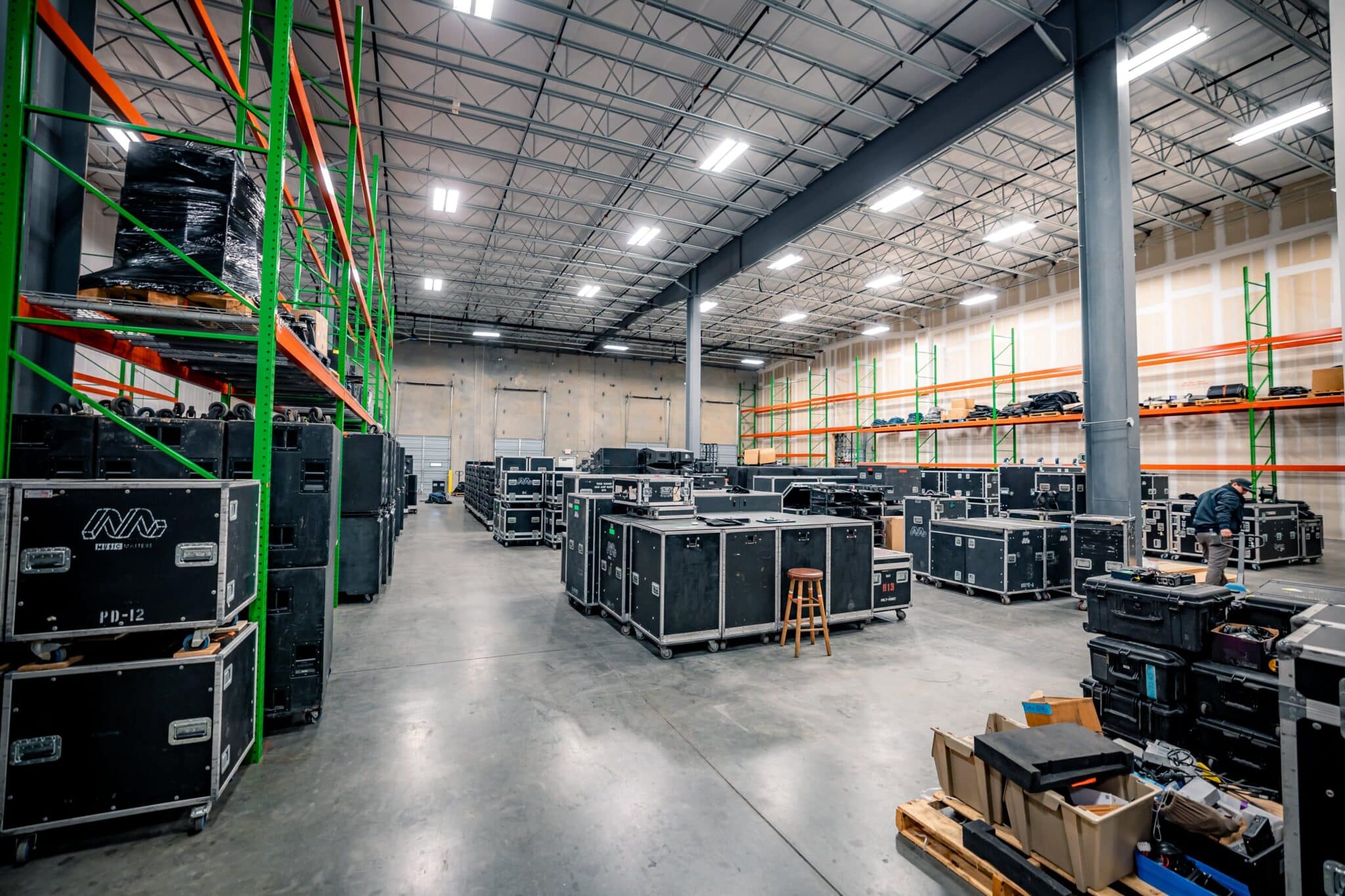
Company adds 20,000 square feet to meet growing demand
Music Matters Productions (MMP), a premier provider of audio, lighting, video, staging and rigging solutions, has expanded its metro Atlanta headquarters, increasing the total warehouse footprint from 40,000 to 60,000 square feet.
In addition, MMP has opened a second 10,000-square-foot building directly across the street to house its growing corporate production division.
The expansion comes in response to increased demand across touring, festival and corporate markets, as well as the continued growth of MMP’s high-end gear inventory. With a fully dedicated shop for each department, including audio, lighting, video, rigging and staging, the new layout provides more space for show prep, pre-rigging and crew coordination, allowing for even more efficient load-ins and streamlined execution.
New features
The rigging department now features a new mobile motor hoist test stand, allowing for in-house motor certification, a service that’s now available to external clients in the production community.
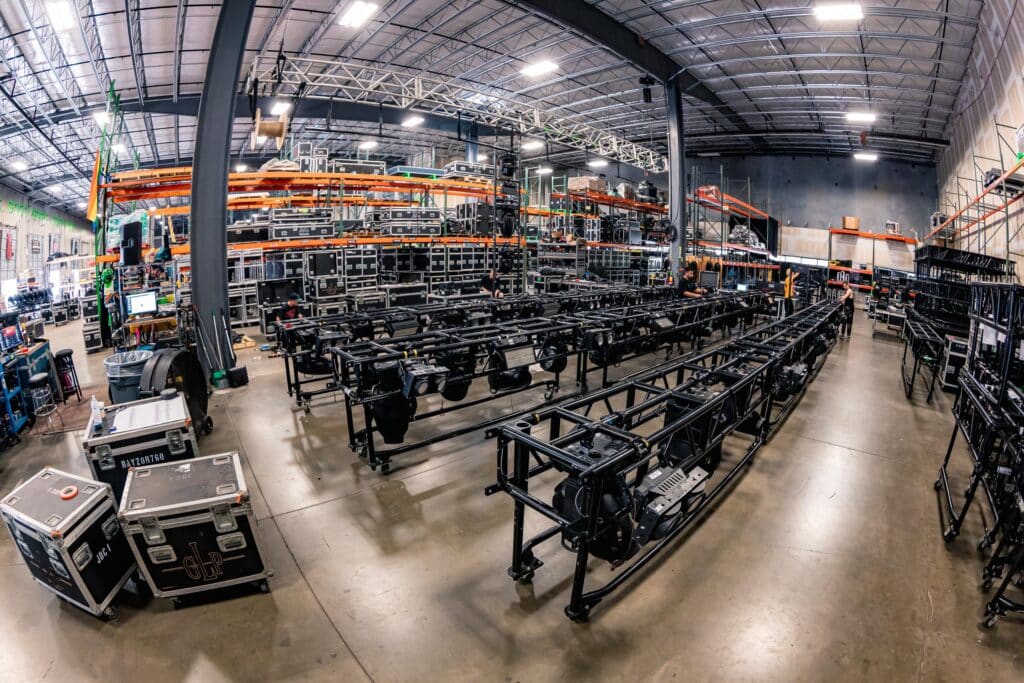
Five new truck bays were added in the process, as well, bringing the total number of bays to 17 — an important upgrade for MMP’s fleet and the increasing number of shows moving through the warehouse each week.
“This growth is a direct reflection of the work our team puts in and the trust our clients place in us,” said Aaron Soriero, owner of Music Matters Productions. “We didn’t expand for the sake of being bigger, we expanded because we needed the space to do the job right. More room means tighter prep, faster turns and better support for our clients.”
Expanding operations
The expanded warehouse and building across the street include additional offices, mixed-use areas and a dedicated repairs department, giving the team more capacity to prep, collaborate, QC and scale for increasingly complex events — both corporate and entertainment.
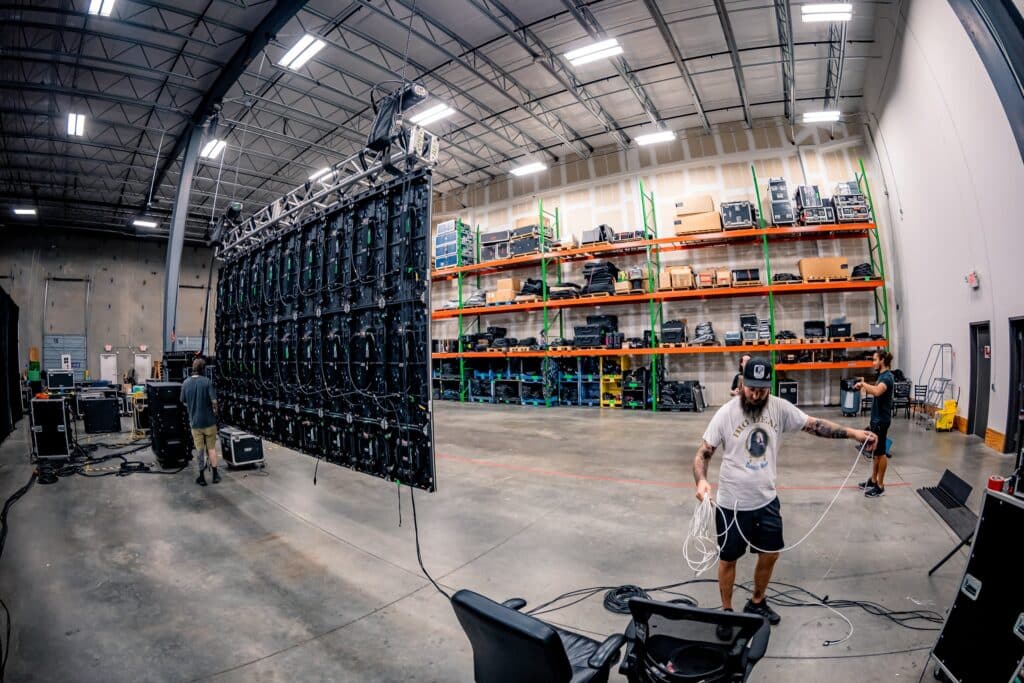
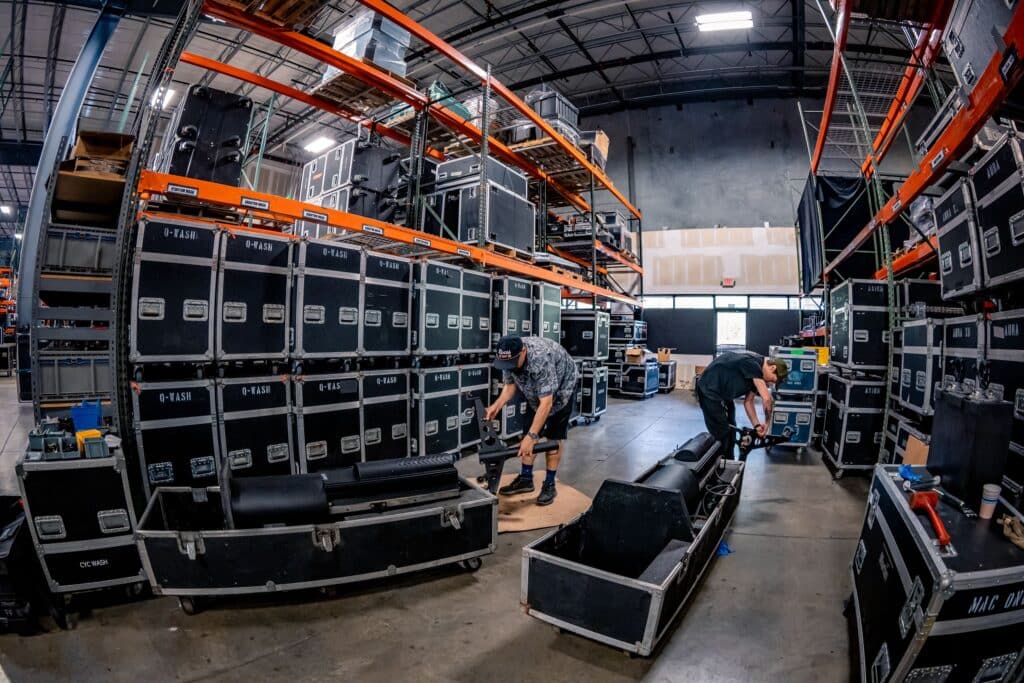
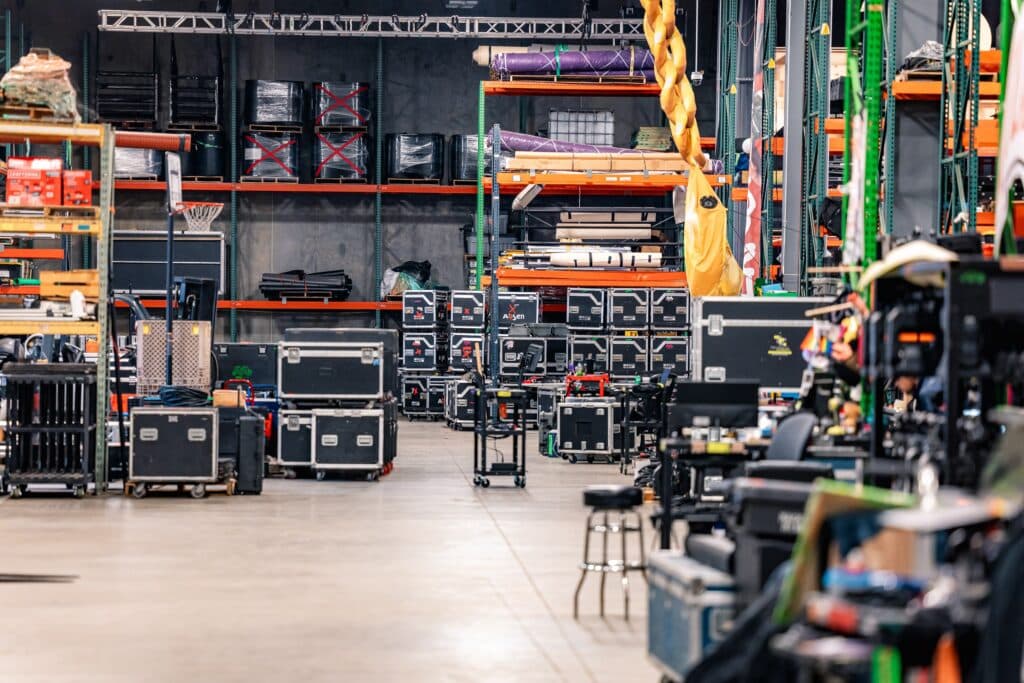
With a reputation built on reliable gear, experienced crews and an enhanced client experience, MMP continues to solidify its role as a go-to production partner for events of every size and setting — whether it’s a beachside festival, a stadium tour, brand activation or a high-stakes corporate show.
About Music Matters Productions
Music Matters Productions is a full-service live event production company based in Peachtree Corners, Georgia, providing industry-leading audio, lighting, video, rigging and staging solutions for tours, festivals, brand activations and corporate events across the country.
Known for its high-end inventory, seasoned crew and deep dedication to doing the job right, MMP supports hundreds of productions each year and is trusted by clients nationwide.
For more information, visit mmp-atl.com.
Related
Business
From Boardrooms to the Himalayas: Vandana’s Journey to Purpose and Growing with Intention [Podcast]
Published
2 weeks agoon
May 19, 2025
How one family blends operational clarity, conscious leadership, and community-driven values to grow their business — together.
In this episode of UrbanEbb, host Rico Figliolini chats with Vandana Aggarwal, VP of Operations at Aggarwal Real Estate, about the winding road from global consulting to family-run commercial real estate in Norcross, Georgia. With honesty, warmth and insight, V shares how she went from working 80-hour weeks in corporate strategy to rediscovering clarity in the mountains of India — ultimately helping transform her family’s business into a community-driven real estate firm managing over 50 shopping centers.
The conversation weaves together themes of leadership, legacy, operational excellence and the transformative power of both AI and yoga. It’s a story about clarity, courage and conscious growth — both in business and in life. This is another episode you won’t want to miss.
Episode Highlights
- Why Vandana left a high-powered consulting career to join her family business
- How hiking Kilimanjaro and studying yoga in the Himalayas changed her leadership mindset
- The operational overhaul she brought to Aggarwal Real Estate to support growth
- What it’s like working side-by-side with your dad, siblings, and 700+ tenants
- How the company rebranded with intention and built a mission around “building communities as a community”
- Where AI is reshaping real estate—from lease drafting to property management—and where it still can’t compete with people
- Leadership succession planning with siblings at the helm
- The importance of clarity, calm, and conscious growth in both business and life



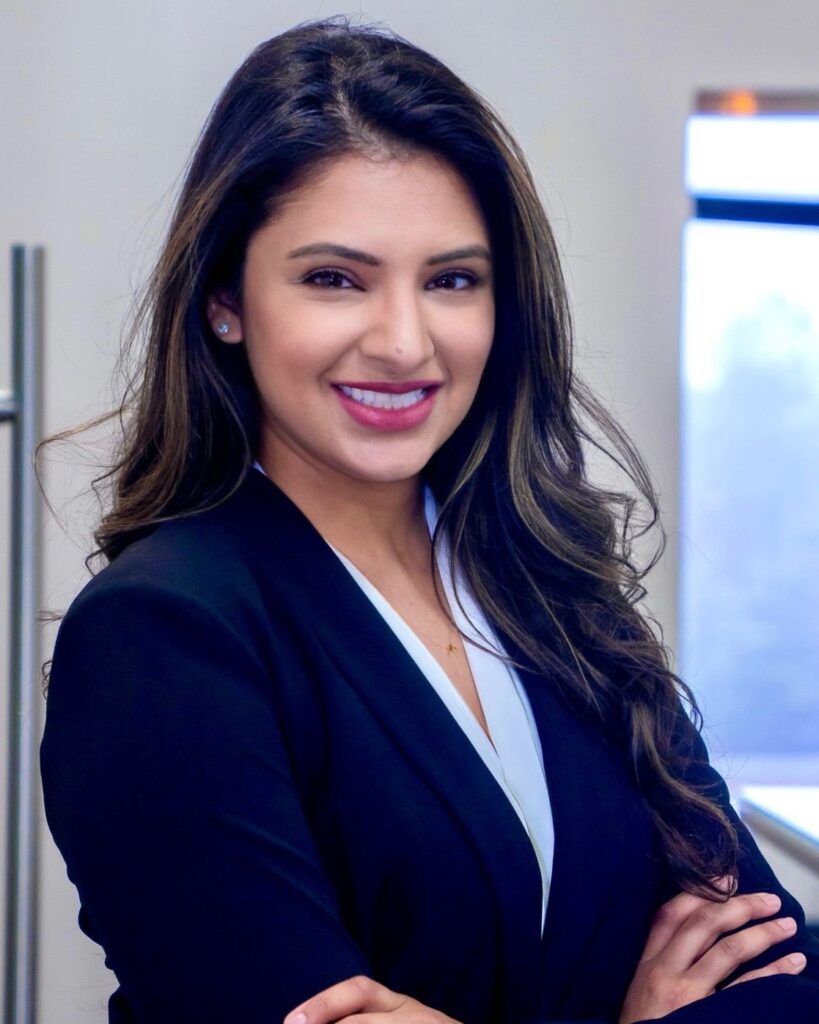




About Vandana Aggarwal
Vandana Aggarwal is the Vice President of Operations at Aggarwal Real Estate, her family’s commercial real estate investment and management firm. She brings a unique blend of strategic insight and operational excellence, shaped by her early career as a consultant at A.T. Kearney, where she advised Fortune 100 to 500 companies. A graduate of Georgia Tech, she also took a transformative detour from the corporate world to spend a year in India teaching yoga—an experience that continues to influence her leadership style today. At the core of her work is a deep commitment to family and a passion for building strong, connected communities.
Timestamp:
00:00:00 – Introduction and sponsors: Vox Pop Uli & EV Remodeling
00:03:12 – From Georgia Tech to global consulting
00:04:23 – Leading strategy for Fortune 500 companies
00:06:11 – The role of vision alignment at the C-suite
00:08:01 – Sabbatical becomes family business overhaul
00:09:35 – Bringing operational excellence to a growing real estate firm
00:12:02 – A year of yoga, nature, and healing in India
00:17:03 – Hiking Kilimanjaro, testing limits, and expanding self-trust
00:18:52 – Navigating family dynamics inside a business
00:21:56 – Planning for leadership transition: siblings, strategy, succession
00:24:06 – Rebranding the business: from American Management to Aggarwal Real Estate
00:26:33 – Where AI fits (and doesn’t) in real estate operations
00:30:04 – Legal, leasing, HR, and marketing efficiency with tech
00:31:01 – Community-focused retail and experiential shopping centers
00:32:00 – Reflections on AI, journalism, and digital trust
00:32:57 – Closing thoughts
Podcast Transcript
00:00:00 – Rico Figliolini
Hi, everyone. This is Rico Figliolini, host of UrbanEbb. This podcast comes out of the city of Peachtree Corners, and we have a special guest today. And if I don’t mess up the name, it’s Vandana Aggarwal.
00:00:15 – Vandana Aggarwal
Absolutely. You can call me V, Rico.
00:00:15 – Rico Figliolini
I’m going to call you V, trust me. And I’m Rico Figliolini, so a bit of a long name there. But V is VP of Operations of Aggarwal Real Estate here, based in Peachtree Corners? No, Norcross.
00:00:30 – Vandana Aggarwal
In Norcross, yeah. Norcross, Georgia.
00:00:32 – Rico Figliolini
Yeah, yeah. Just off 85, and?
00:00:34 – Vandana Aggarwal
Jimmy Carter.
00:00:35 – Rico Figliolini
And Jimmy Carter.
00:00:36 – Vandana Aggarwal
We’re completing each other’s sentences already.
00:00:39 – Rico Figliolini
But where are we doing this? We’re doing this from one of our great sponsors, one of our two great sponsors, Vox Pop Uli. Was this tastefully obnoxious? Let me tell you, I asked them to do a corner cut for us, and this is perfect. So they have the Moxie logo and stuff. So they’re branding, right? Same way they can brand your stuff. They’ll put your logo on anything. They’ve done, I think, 6,000 vehicle wraps. They’ve done garments, obviously. They could do one-offs or they could do 1,000. They do trade show booths, wraps, everything. So anything you need a logo on, think of what object you want it on. They’ll figure it out for you. And if you’re doing, let’s say, 5,000 mailers and you want that database customized for each postcard, they could do that also. It’s called data. I forget what it’s called, but they can do that. They can work the data into the printing as well. So all customizable. Check them out, voxpopuli.com. Now, getting to something we were talking about, hands-on stuff, which is this also. This can’t just be done by machines, right? Although machines, you still need people. But EV Remodeling Inc., they are a remodeling company. They can do design to build. They can do whole house renovation. They can create your deck, your backyard gazebo. They can put a bathroom, kitchen, anything you want. EV Remodeling Inc. is owned by Eli and his family. Lives in Peachtree Corners. It’s based out of our city. They’ve done, I think, over 250 homes recently. So check them out, evremodelinginc.com. And I want to thank both of them for being great sponsors of ours. So, it’s always a long stretch doing that, but I’m glad to have you, V.
00:02:22 – Vandana Aggarwal
I’m happy to be here. Thank you for inviting me onto your podcast. Excited to chat with you.
00:02:25 – Rico Figliolini
Yeah, no, this is cool. Well, you know, I met you, where did I meet you at? I think it was the chamber.
00:02:30 – Vandana Aggarwal
Yeah, the Southwest Gwinnett Chamber event.
00:02:32 – Rico Figliolini
Yeah, and we were talking a bit, and I was like, damn, you know, I had my father owned a business, and he wanted his kids to be in it. None of us, none of us could go into that business. It’s a little difficult, different industry. It was a hard industry, plus my father was very patriarchal, very over-demanding. God bless him. He mellowed in age. But when you were telling me about your family, I mean, your father, your mother, your sister, your brother, and you, I mean, all in it. It’s amazing.
00:02:55 – Vandana Aggarwal
We’re all together. We’re the modern-day Brady Bunch.
00:03:03 – Rico Figliolini
I love it. Yes, that’s exactly it. But, let’s start a little bit. I mean, you were telling me, I mean, you came from a consulting world. You came where you were actually being paid a lot more than you’re being paid right now, actually.
00:03:12 – Vandana Aggarwal
I told my father he couldn’t afford me when he recruited me out. So I graduated from Georgia Tech in 2007. I actually did join his company right out of college for two years, learned a lot about the company. He actually had me go through a rotation in every department of the company to learn more about what we did, how we operated. And I think very quickly, it was also 2008-9 with a recession. But I was also very interested to learn how big companies operate. How can you take a small company at that time? We were much smaller than we are today and really understand how do you go from this, which is where everyone starts, right? As a new company to get to be one of the largest in the nation, in the world and see how they operate, how they grew it from, you know, a mom and pop business to this global enterprise. Consulting was a natural transition to learn about multiple companies, multiple industries. So transitioned into AT Kearney, which has now been rebranded as Kearney, and out of their Chicago office. So I was there for seven to eight years, almost eight years.
00:04:23 – Rico Figliolini
Entry-level position you got in?
00:04:24 – Vandana Aggarwal
Yeah, I went in as an analyst. The good thing with that experience was by the time I left, I was a senior manager with Kearney. I worked across 17 different companies in those eight years. So I got to experience how CPG companies, retail companies, transportation, IT, you name it, I’ve done it. In terms of the different types of industries I got to work with, worked with a lot of Fortune 100 to 500 companies at the C-suite level. So we were coming up with all kinds of strategy projects such as new market entries, mergers and acquisitions. A lot of what I ended up specializing in in those seven years was operational efficiency and growth strategy. So it was an amazing, I’m grateful for that learning experience, the you know the caliber of minds that you work with. You also get to experience what the C-suite looks like. How does the very top operate and then it goes from the top down right? So it is very much led at this very top leadership and you see how companies change in their culture the way they operate based on how the top is designed.
00:05:38 – Rico Figliolini
So did you see good and bad at the top?
00:05:41 – Vandana Aggarwal
Absolutely. And I’m not going to name names. But you learn a lot when you see how your CEO and your C-suite right below them, the culture they’re bringing into a company and their vision and their goals if they’re aligned, unaligned. Anyone that at the very top have different viewpoints of where the company has had it is where companies start to break apart, lose revenue, lose their you know people, which is very important.
00:06:11 – Rico Figliolini
Where did you see the pain point then? What was the common denominator I guess of those?
00:06:18 – Vandana Aggarwal
There’s no one common denominator, but if I had to kind of narrow in, it comes down to what is our five-year, ten-year trajectory? Where are we headed? As large companies grow, you’re not just in one industry. You’re not just doing retail shopping centers. You’re investing in all kinds of properties just to bring it back to our company. Similarly, a CPG company can make all kinds of products, so they have to decide what it is because you have to be concentrated on the right places. If you have a leadership team that is in alignment of what that ultimate goal is, right, then you have clear strategies and, you know, metrics you’re measuring your success against. So that was a big thing that I learned. Also just, you know, seeing how great leaders operate, right? Some of the best in the nation today, I got to be in the room with them and just to see how they lead is very important.
00:07:14 – Rico Figliolini
Did you see any family dynamics in any of those businesses?
00:07:20 – Vandana Aggarwal
No. You know, there may have been like a father-son duo, but when you’re looking at the very top, I won’t say it was like all in the family, right? You know, and it also becomes the size of a company, right? You know, when you get to an international scale, you’re not always blessed that every person in your family has the right skill set and experience to fill each role on that C-suite.
00:07:46 – Rico Figliolini
I’m just thinking Trump for some reason. Every kid has a job.
00:07:51 – Vandana Aggarwal
Every kid has a job.
00:07:52 – Vandana Aggarwal
You had the accent, right?
00:07:54 – Rico Figliolini
Pretty much, I guess. So after the C-suite or expansion, you traveled a lot too, I think, right?
00:08:01 – Vandana Aggarwal
I did, yeah. So after my seven, eight years in consulting, I was reaching 30. And Shiv, my father, came to me and he said, you know, you’re doing this for a lot of outside companies. Why don’t you help us grow and bring your expertise home? And I said, look, I’ll take a sabbatical. Let me assess the company. And after that period where I took a short sabbatical to come look at how we were operating, I said, I can give you three years. I said, you can’t afford me, but I’ll give you three years of my time. And I said, I think it’ll be the right, it was the right time in the company. We were investing very heavily. We were bringing in a lot of new square footage into the company, and we weren’t designed to manage it. So we as a company, as you know, we are the investors. We have an in-house management company, an in-house leasing company. So as we acquire new properties, our team does the management for those properties in-house. We don’t provide third-party services today. And we do the leasing in-house. But at that time, when he, you know Shiv started we had one or two and now we’re at 50 shopping centers plus and other investments that we have. And there’s a very different way you operate you know and how do you how does the CEO go from being an operator to where he’s overseeing it, but he’s not into the weeds right? So he has create a system for that to happen right? You have to have standard operating processes for your property managers, your accounting team, your marketing team.
00:09:35 – Rico Figliolini
And you quite didn’t have that before.
00:09:37 – Vandana Aggarwal
We didn’t, no. And, you know, and I think that’s why he wanted to bring me in is because my strength is operations and I love it. I love going into messy places and cleaning them up.
00:09:49 – Rico Figliolini
Is that what you did when you were a consultant?
00:09:51 – Vandana Aggarwal
A lot of what I was concentrating on at the end of my consulting career, yes. So I did a lot of operational efficiency work. So we’d go in, assess the way companies were designed. And we’d interview hundreds of team members to understand what their role is. You know, what are they responsible for? How are they delivering? What are they measuring for success? And then we’d redesign the way they did that based on, again, bottom line, what are your ultimate goals for the company?
00:10:21 – Rico Figliolini
So you had to understand that before you got to that point. And you’re not making the decisions, the C-level.
00:10:29 – Vandana Aggarwal
Present, right? And similarly even with Shiv, when I first joined, I said, look, this is how I think we need to redesign the company from a bottoms-up perspective based on ultimately our goal of growth, doubling, tripling in size over the next ten years. And I think this is where the father dynamic came in. I guess he trusted me. And he said, do it. He just said, do it. And it was beautiful because right when you’re with large companies, it’s a lot of time before you get. Those decisions made and that trust, right? And so it was great. And he said, yeah, just put it into place.
00:11:07 – Rico Figliolini
See, that’s a great dad, actually. Some dads would be like, I don’t know about that daughter or son or whatever.
00:11:16 – Vandana Aggarwal
It did take time, though, like to ultimately, he was in the operation so heavily. And, you know, until today, I’m still like, step up, step up. Like, I need you to not get into the weeds. Like I think at that time we had tenants calling him, maintenance guys calling him. Like every little and big problem would go through his cell phone. I said, you’re too smart and you’re such a good investor. This is not your skill set. You shouldn’t be managing this. You need to bring people on who are expertise in this area. And I said, you need to be focused on like the larger plan.
00:11:51 – Rico Figliolini
This way you can grow it better.
00:11:51 – Vandana Aggarwal
Which I think has been very successful over the last eight years I’ve been with him now.
00:11:57 – Rico Figliolini
So before you got to him, though, you were traveling a bit internationally as well?
00:12:02 – Vandana Aggarwal
Yeah, yeah. So this is an amazing year. I was very burnt out. By the time I left consulting, I was working 70 to 80-hour weeks, traveling Monday through Thursday, if not more than that, of the week. So I told Shiv, I was like, I’m going to take a month. I’m going to go to India, get my yoga certification. No intention to teach at the time. I just said it’d be a great one-month retreat. And I was up in the mountains like Himalayas and India in a city called Dharamshala. Beautiful place. One of my favorites in the world. And I just, I think I needed it for myself emotionally, mentally to take that break. So I turned one month into one year. I didn’t know it was going to be a year.
00:12:49 – Rico Figliolini
In that same city? In that same town?
00:12:50 – Vandana Aggarwal
Yeah, so I ended up the school that I had gotten my certification with. I asked them, I was like, do you mind if I hang around for a little while? Like very casually, I’m like, you know, I’ll pay for my room and board, but I just want to be around this group and this energy. And they said, well, if you’re going to be here, why don’t you intern? And they’re like, room and board is free if you intern. I was like, sure. You know, not thinking what it was leading to. This is like that beauty of the universe coming into play. Yeah, so I started teaching, ended up loving teaching. So then I ended up teaching the 200-hour yoga training course. And I was in Dharamshala for four months. And then I moved down to Goa, their Goa campus for another six.
00:13:30 – Rico Figliolini
Where is that? Goa?
00:13:32 – Vandana Aggarwal
Goa? It’s in southern India on their west coast. It’s a beach town. Yeah. So I had the mountains and the beach. But I’m a mountain girl. I’m a hiker. But no, it was a beautiful experience. Very different from anything I’ve done with my career, right? But I became a yoga teacher for a year.
00:13:52 – Rico Figliolini
Did that clear your head? Yoga, they say, can do that, right?
00:13:53 – Vandana Aggarwal
Yeah, it’s all the tools of yoga, right? The meditation, the breath work, really getting internal, going in, right? Just going inwards, being quiet, which we don’t have. We have a lot of noise in our life today, you know? And naturally, right? Between family life, work life, social, and then just all of the noise from everything else right? Like we’re sitting here and I can hear the cars right? So you know that difference was when I was sitting there, I could hear the ocean waves and so there’s something very healing in nature naturally. So it was the tools mixed with nature and I still think nature has a very strong healing power on us. So whenever I can, I try to get out on a mountain and by the ocean. But yeah no it was it was a beautiful experience but it did bring a level of calmness into the way I approach things. It changes your perspective of you know at the end everything’s okay. No matter what you’re going through it’s temporary you’re, and everything that’s happening to us is happening to us for the good. We don’t know it, sometimes it seems like a bad situation in the moment, but ultimately you know, universe, God, whatever you believe in is at play to bring you something better in your life. And you just have to step back to understand what is it delivering us.
00:15:19 – Rico Figliolini
I like the way you think. My wife every once in a while would say, aren’t you upset about that? I’m like, I think come tomorrow, it won’t mean anything. There’s no point in, just relax. Not everything, two days later, it’s not as important as it seemed at that moment.
00:15:37 – Vandana Aggarwal
Yeah. And it’s not just that it’s not as important. It’s also like…
00:15:41 – Rico Figliolini
In perspective?
00:15:42 – Vandana Aggarwal
It’s, what am I gaining from this? Like, what can I gain from this? Oftentimes when, you know, a lot of things happen, yeah, like you get hurt or, you know, it’s like in relationships, right? Or if you have a bad business deal, right? It’s like, hey, how am I growing, right? And I think that’s what makes life very exciting, right? Otherwise, if you’re always living on a high, is it a high?
00:16:06 – Rico Figliolini
Yes. So I’m thinking you were a consultant for seven or eight years. 80 hours a week. And all of a sudden you’re doing yoga on the mountains of India. It’s just like, it’s almost like a movie. It’s almost like…
00:16:18 – Vandana Aggarwal
Eat, pray, love?
00:16:19 – Rico Figliolini
Yes.
00:16:20 – Vandana Aggarwal
It was my eat, pray, love moment for a year.
00:16:23 – Rico Figliolini
That’s amazing.
00:16:24 – Vandana Aggarwal
No, you meet amazing people, but I think we were meant to meet everyone that we come in interaction with on a daily basis. You naturally have a connection. There’s a universe at play, and we were meant to cross paths and learn something from each other, gain something from one another, give to the other person. And I think you just have to look at life that way.
00:16:48 – Rico Figliolini
I definitely think along that way. I mean, I definitely think each of us nudges each other in a crowd a little bit. That one nudge can set you off going in a different direction. So I totally believe in that. So you joined your dad. Yes. And you’re, so actually, even before we get there, so yoga, but what other interests have you been?
00:17:03 – Vandana Aggarwal
Yeah. So, I mean, I’m an avid hiker. I’ve done recently in the last few years, I’ve climbed Kilimanjaro. I did the Machu Picchu trail. I’ve done a few 14ers out in Colorado, but I like to test myself physically. You know, just, again, it comes down to how do we find that push within us past our comfort zone? So is this a physical inability or is it a mental constraint? So to get past that mental constraint of discomfort and then really push yourself to the next level and say, I can achieve something. It’s not going to be easy. So to me, if I’m on a hike and it’s not hard, I’m like, well, was it a hike? Like it didn’t test me, but no I think, you know.
00:17:55 – Rico Figliolini
You should do the Appalachian Trail. That’s like 2000 plus miles.
00:18:03 – Vandana Aggarwal
I know. And it is, you know, it’s not just like the hiking part. It is like living out in nature and, you know, sleeping in uncomfortable conditions. Yeah. Walking in the rain. It’s cold. I think the last day of our Kilimanjaro hike, it was negative 20 degrees up in the mountain and my eyelashes were frozen and I couldn’t feel any part of my body. And, you know, and it tested my breathing. And there is that element of push yourself to the point that it’s not your ego anymore. Like if your body’s saying stop, you have to stop as well and respect your body. But yeah, to really test yourself.
00:18:38 – Rico Figliolini
To circle all that back now, you’re back home. You’re working with your father and your family. A lot of businesses grow or die because of family. If it’s a family business, right?
00:18:52 – Vandana Aggarwal
Absolutely, yeah.
00:18:53 – Rico Figliolini
So you have your highs, your lows, your, sometimes you don’t get along. Sometimes decisions are split. People get upset with each other. So you’ve been at your highs and lows physically and mentally doing other things. Has that helped you in some ways? Not that you’re having a bad time with family. Because it sounds like you all fit just fine, like the Brady Bunch.
00:19:15 – Vandana Aggarwal
Let’s keep it that way. No, I mean, there’s multiple dynamics at play. It is a family business. My father is also my boss. My siblings are also my friends and my coworkers. And it’s about no matter how hard you try, you cannot separate those relationships. There is an interplay of all of it when you spend eight to nine hours a day together. But we all have, again, a common goal for the company. And then a common goal for our personal relationship. So when we sit down, we keep in mind that we like each other and we want to keep it that way. Like very simply put, that’s first and foremost for me especially. Even when Shiv had brought me in, he said, oh, can you manage everyone? And I said, I’ll manage everyone but my brother and sister. I said, you know, like I won’t jeopardize the relationship I have with them as a sibling by being their manager. Especially because I said that’s your job like good luck. But not just that it’s you know we all have different skill sets so I said how do I manage my brother who is a genius he’s a CPA by trade you know like I can’t tell him how to run the financials of this company like he’s supposed to teach me that right? And same way I teach him that. My sister has a master’s in marketing right? She is by far the most social, likable person you’re going to meet, and she knows how to work with people. I said, she needs to teach us that. So I think we’re lucky that each of us, and this is, I think, rare, where you have three kids and each one of them has their own skill set. That, I think, helps us stay in business and we see ourselves foreseeably into the long-term future being in business together is because we each bring something very unique to the table. Ultimately we value the relationships that we have on a personal level as a family above all else right? And then you know the element of like, how does the yoga experience a hiking experience teach us. That’s, it’s not specific to anyone’s situation, I think it’s a baseline of who you become right? The foundation. Like it teaches you patience, it teaches you again, everything is temporary so let’s not get overly attached emotionally or get upset or too joyful, even like, let’s just stay neutralized on any situation because it will end. And then the next one will come up and kind of flow with the ebbs and flows of the ocean. You, you flow with everything that comes with you, comes your way at work, at home. But yeah, I mean, we do sit down as a leadership team. I, my father and my siblings and I, and we talk about, hey, we separately do the exercise. Where are we going to be in five years? What role do we play in that journey? And thankfully, all of ours are very similar in what our goals are. And then we have different skill sets that we bring. So even as we design the future of the company in a moment where my father is not at the head of the table, we’re working on that redesign work. But it’s very conscious. It’s very intentional. Again, we all step back and say, hey, look, how do we maintain, how do we solve problems? Because like, you know, we were talking about how tomorrow we may not agree on something, a big decision. What are we investing in? Come back to, you know, right now Shiv gets to make an ultimate decision because he’s the one leader at the top. Tomorrow it’s going to be three people at the top. How do you deal?
00:23:04 – Rico Figliolini
So is there an exit plan for your dad? Well, not an exit plan.
00:23:09 – Vandana Aggarwal
Not an exit plan. He already has. I think he, you know, he’s gone from, he’s the hardest working person I know. I get that from him. We’re addicted to work.
00:23:18 – Rico Figliolini
80 hours a week.
00:23:21 – Vandana Aggarwal
We love working. You know, this company is his baby. I think I’ve adopted it at this point and we all have. But, to stay mentally sharp, to stay alive, you have to keep working. You have to keep doing something. You have to be working towards something that brings you joy and purpose. And I think, you know, he stepped back to take time towards a lot of his nonprofit work, community work that he’s very much engaged with. But he’s still at the top. He’s still running, you know, his, you know, he’s, you know, not slowing down. You know, we’re constantly growing. We’re growing this year in a large scale, which is amazing, and he’s leading that charge.
00:23:59 – Rico Figliolini
How many properties do you own?
00:24:02 – Vandana Aggarwall
Today we have 50 shopping centers and then a few other assets.
00:24:06 – Rico Figliolini
Is that like 3 million square feet or something? 4 million?
00:24:10 – Vandana Aggarwal
Yeah, over 700 tenants. But, you know, when we sat down a few years ago, we rebranded. Aggarwal Real Estate didn’t exist until two years ago. It was American Management Services. And we had a rebranding effort because we said we want the company’s name and the brand to represent who we are.
00:24:33 – Rico Figliolini
I like that, by the way.
00:24:35 – Vandana Aggarwal
Yeah, it needs to mean something. And we were also proud of what our father has achieved, right? He’s given us this beautiful life that we get to help grow upon. So we said it needs to pay homage to him. So we said, let’s make it Aggarwal Real Estate, ARE. And then as we were deciding what that vision is, we’re a family. In the company, we are a family, not just the four of us, but all of our staff, our team. We don’t, you know, we don’t look at them separate from who we are. And so we said our mission as a company is building communities as a community. And it talks about, hey, in all of the real estate work we’re doing, we try to make sure all of our properties are beautiful. Our tenants are happy. They have direct access to each of us in the company. And on top of that, as a company, we are a community within ourselves because we can’t create them until we are one. So it was very intentional to who we already were, but putting it into brand terms.
00:25:37 – Rico Figliolini
It’s amazing. All that property, tenants. Can’t imagine father tech can send text messages on all their problems, if they have any.
00:25:45 – Vandana Aggarwal
He’s a brilliant man.
00:25:45 – Rico Figliolini
You could be too possessed on that stuff. We want to be cognizant of our time together.
00:25:55 – Vandana Aggarwal
Absolutely.
00:25:57 – Rico Figliolini
So the next subject really was going to be about also AI, because everyone’s talking about AI. We were talking about that before the show started, before we started recording, which was kind of funny because V was asking me if we edit anything. And I was like, no, straight through.
00:26:11 – Vandana Aggarwal
I wanted to see if I could say a few things and then have it taken out of this conversation.
00:26:13 – Rico Figliolini
Nope. Nope. Doesn’t work that way. So, but ChatGPT, AI, that’s all. I mean, you know, could I create a bot to edit this? Probably. But there’s so many things we use in our lives. And you’ve been talking about how it would affect your business. Nevermind the consulting work you did.
00:26:33 – Vandana Aggarwal
Yeah. I mean, the consulting world is, I mean, it depends on the industry, the type of work you’re doing. In real estate, I’ve put a lot of thought behind this. There’s a lot of conversations happening across every industry, every sector, whether it’s education, automotives, real estate, et cetera. Everything’s being discussed. How is that changing the future? How do we incorporate it to be more efficient, right? Be the best in the industry that we can be or operate better. And so for me it’s again comes down to that operations element that I think about like, how do I incorporate it for a company that’s a medium-sized real estate firm today as we become a large company, a bigger player in the market. And people are very important in real estate right?
00:27:17 – Rico Figliolini
Talk about editing?
00:27:20 – Vandana Aggarwal
I was telling you, we should bring them into the podcast.
00:27:27 – Rico Figliolini
We’re going to run a little longer on this.
00:27:36 – Vandana Aggarwal
But let’s take retail shopping centers. This is brick and mortar. I did a paper actually for a large mall retailer back in my consulting days on how the title of the paper was, is brick and mortar dead? And, you know, full circle, I am fully dedicated to brick and mortar, retail, office, multifamily now. But you still need people to clean up your properties, fix your maintenance issues. We were talking about roofing, plumbing, electrical. That is hands-on work. You know, today there is, it’s going to be a long time before there’s a robot that comes in to do that. There will be. I don’t know. I do not see that in 10 years to say we’ve got roofers that are robotic drones that are going to come fix my roof problems.
00:28:24 – Rico Figliolini
Zumbas, they’re going to run around the roof or something.
00:28:26 – Vandana Aggarwal
That’s actually genius. A Zumba for my roof.
00:28:31 – Rico Figliolini
Why not? Attach it to the right thing.
00:28:33 – Vandana Aggarwal
But so those are very people-oriented roles today. Technology will advance how quickly it’s done or how well it’s done. But you’ll still need someone to operate the machinery of it and everything.
00:28:49 – Rico Figliolini
Just not as many.
00:28:50 – Vandana Aggarwal
Yeah. Construction, similarly, right?
00:28:54 – Rico Figliolini
Unless you 3D print a house. I’m sorry.
00:28:56 – Vandana Aggarwal
No, it’s true. It’s true. There’s so many options. I’m thinking 10 years now. I’m not going to have a 3D printer making the metal framing for my new construction project. You know, or installing the sheetrock, it does probably speed up the process, right? There will be machinery to help with that, a lot of AI development in that way. It’s a lot at an office administrative level, right? The speed in which you’re processing invoices, the speed in which you are, you know, getting payments taken in. Today, I would say as far back as right before COVID, we were still accepting checks for money. Now it’s all online. Like we do not accept money coming into the office, or it’s very limited to what we do, right? So that’s AI, if you think about it, right? The ability to pay online.
00:29:42 – Rico Figliolini
QuickBooks Online uses AI now, you can enable it.
00:29:47 – Vandana Aggarwal
So we’ve been using it for many years. The advancement of it has been a little bit slower, and now it’s sped up. Marketing, we were just talking about how you created a flyer on ChatGPT, was it?
00:30:00 – Rico Figliolini
I won’t talk about the student that’s helping us out here and how they use AI.
00:30:04 – Vandana Aggarwal
No, AI in school, right? But yeah, it’s an AI processor for my HR roles, right? Instead of reading 100 resumes, it’s going through the system to filter them out. Whether it’s writing contracts, I won’t lie. Legal jargon is coming out of ChatGPT today. And so it’s speeding up the way we’re doing work. But my legal team probably, and they won’t say it, should be using AI if they’re not. To help create some of this work right? So it’s like these companies are still going to be needed, but the way that they’re able to respond to us at a quicker, everything would just happen faster right? From typewriters to computers, everything.
00:30:49 – Rico Figliolini
Especially if they know that they just did a lease from you for this property in Texas, that we need three more leases done for three other places, it’s not going to be that much different, right? It’s a template.
00:31:01 – Vandana Aggarwal
It’s coming out a lot faster. Yeah, I mean the negotiations, that’s a people-to-people thing right? So I think thankfully in the real estate world we’re still going to need people. We’re still going to need buildings right? The way built, we were just talking about how a retail shopping center is no longer just for shopping. It has to be for entertainment. It has to be for bringing families in and giving them more than just, hey, go into a TJ Maxx and buy something, right? It’s like, what else are you getting when you’re at that center? Whether it’s a play space or events, we’re starting to do more events at our shopping centers. So it’s, again, serving the community.
00:31:39 – Rico Figliolini
We’re seeing that more. More of that happening. We could go on and on here.
00:31:46 – Vandana Aggarwal
Chatting with you.
00:31:46 – Rico Figliolini
Yeah, and we should probably do one on either AI in the marketplace. Or maybe a panel discussion on something similar.
00:31:51 – Vandana Aggarwal
Yeah, overall, yeah. That would be exciting.
00:31:55 – Rico Figliolini
Yeah, I think that would be cool.
00:31:56 – Vandana Aggarwal
I think it’s interesting to learn about kind of where every industry is heading. It impacts all of us.
00:32:00 – Rico Figliolini
For sure. I mean, the magazine business, I mean, it’s all like we have certain, we have AI rules. But, you know, AI is still being used to degree to research things. And to do certain things like that. You know, hopefully journalism isn’t just handed over. They do say 40% of the internet is AI written. So, which is kind of incestuous almost because it’ll just feed on itself at some point.
00:32:27 – Vandana Aggarwal
There’s a whole discussion about the validity and the trust behind digital content. In the next few years. I think it’s going to diminish.
00:32:35 – Rico Figliolini
Oh, yeah. I mean, I’m seeing videos now and it’s just like, it just looks so real. And you could not tell the difference, even voice-wise.
00:32:42 – Vandana Aggarwal
And that’s scary to think. It’s like, how do you trust what you see?
00:32:47 – Rico Figliolini
So on that note, and since this is not edited, so this is right from the beginning. So this is all true. But I want to thank everyone. I want to thank you, V, for being with me.
00:32:57 – Vandana Aggarwal
Thank you so much for having me. This was a great conversation.
00:33:01 – Rico Figliolini
It went by way faster than some of these go. So this is a great discussion. Thank you, everyone. I appreciate you for joining us. Thank you for Vox Pop Uli for the studio look and for letting us do it here, for being a sponsor and for EV Remodeling. Also, I want to thank Jeremy Pruitt behind the camera who has taken care. He’s a Paul Duke student. And it wasn’t him that I was talking about before, by the way. But all the work he’s done on the back end on this. So thank you, Jeremy. So thank you all. Thanks for being with us.
Related
Business
Peachtree Corners Grows Business Opportunities Through Economic Development
Published
3 weeks agoon
May 6, 2025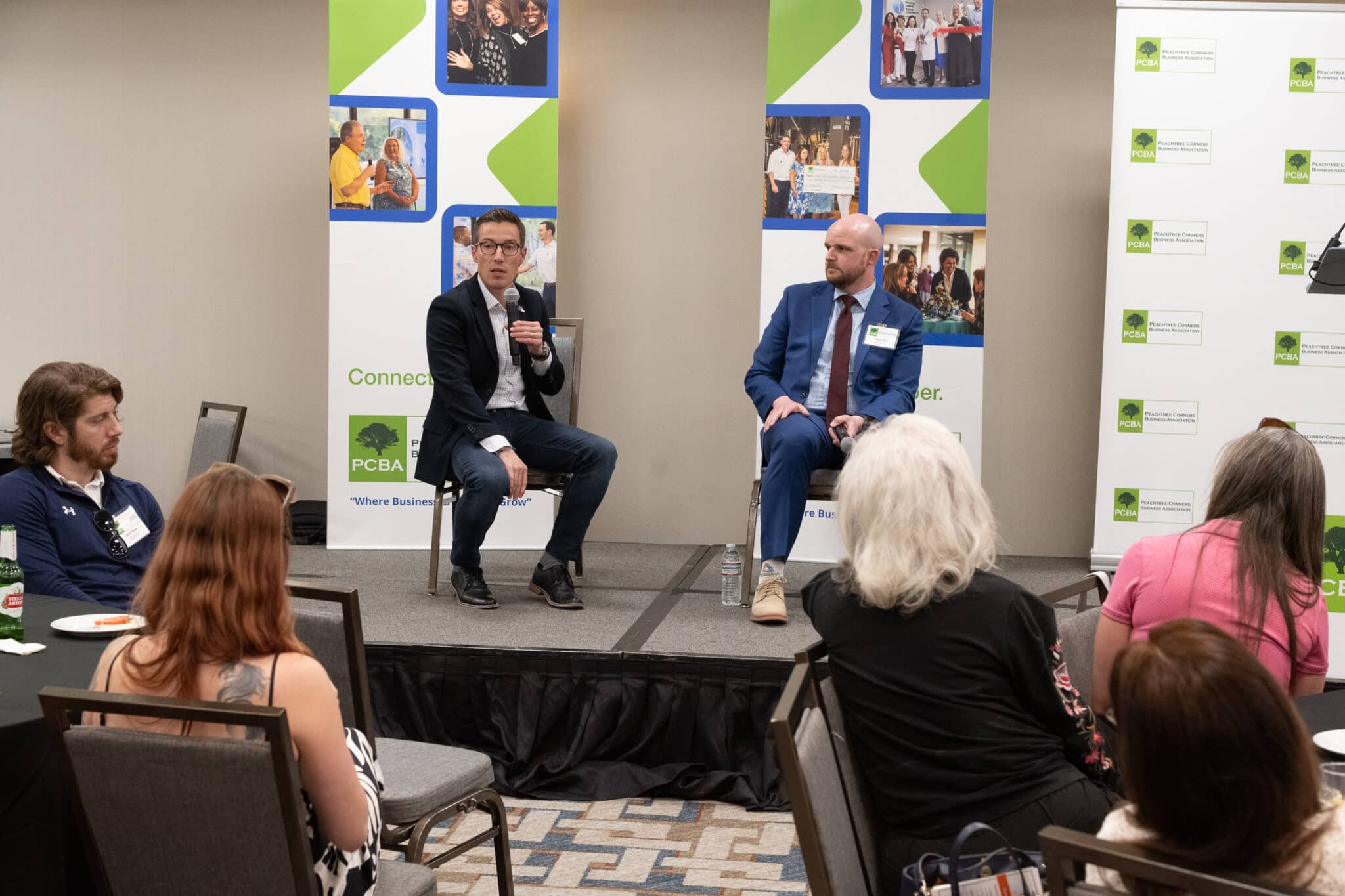
Most residents and business owners in Peachtree Corners probably think they know all about the economic development and strategic planning of Peachtree Corners, but do they really?
Peachtree Corners Business Association invited Peachtree Corners Economic Development Director Betrand Lapoire and Partnership Gwinnett Director of Economic Development Andrew Hickey to its After Hours Speaker Series on March 27 to discuss the city’s growth from a 1971 master plan to a bustling city with 42,000 inhabitants and 40,000 jobs.
Key points included the importance of business retention and expansion, with 24 projects last year creating 1,600 retained jobs, 1,600 new jobs and $250 million in new capital investment.
The Curiosity Lab, a world-class innovation center, was emphasized as a significant attraction. The city’s zoning and infrastructure plans were also discussed, focusing on balancing office and residential development to maintain a vibrant, sustainable community.
Matching jobs to residents
Although Peachtree Corners is just a teenager in terms of being an incorporated city, the foundation for this vibrant, fast-paced economic hub was laid more than 50 years ago by technology pioneer Paul Duke.
“Peachtree Corners was the first master-planned, business innovation technology park in metro Atlanta,” said Lapoire. “It was in response to the brain drain of technology with Georgia Tech graduates leaving the area.”
While the city may have a small-town feel, it’s the largest in Gwinnett County by population, but not land mass, he added.
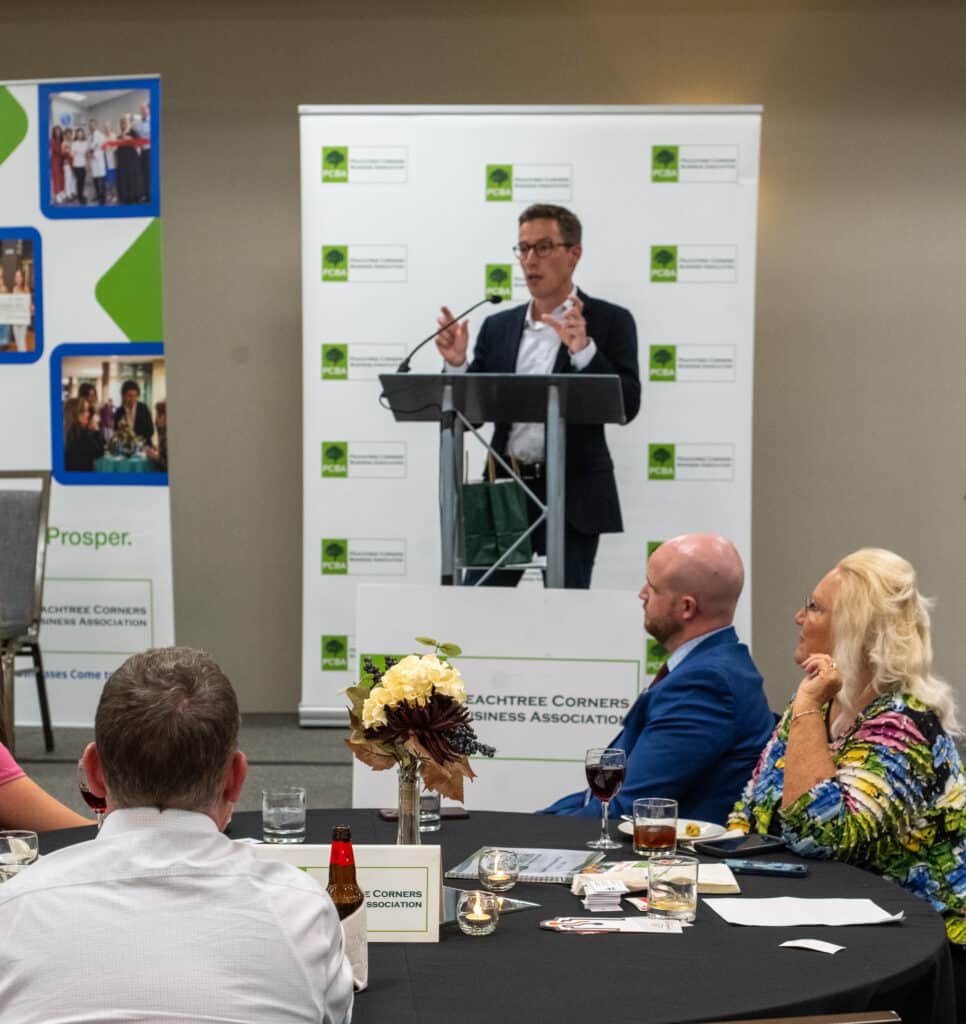
“The city started from a commercial, industrial, R&D base and then was expanded around it,” said Lapoire.
Though home to more than 42,000 residents, most of the jobs in Peachtree Corners are filled by people who live outside the city, he added.
“So we have this interesting mismatch, in a way, although not unusual,” said LaPoire. That creates traffic and transit issues. So that means that one of the solutions is to create more jobs here to fit the profile of the community.”
He presented charts that show professional services, consulting and engineering as the largest job categories. The next tier of businesses are wholesale and manufacturing.
“So we have a good mix of industry,” he said.
A five-year plan
The city has a five-year economic development plan (2023-2028) that outlines strategies for attracting and retaining businesses, with education and workforce development being key components.
Partnership Gwinnett has similar goals as Peachtree Corners, but on a larger scale.
“We are the county’s sales and marketing arm for all 17 cities now, and we receive funding from both municipal sources as well as existing businesses here — both in Gwinnett and outside of Gwinnett as well,” said Hickey.
He shared how Partnership Gwinnett is designed to drive a lot of major corporations toward doing business inside and with Gwinnett County.
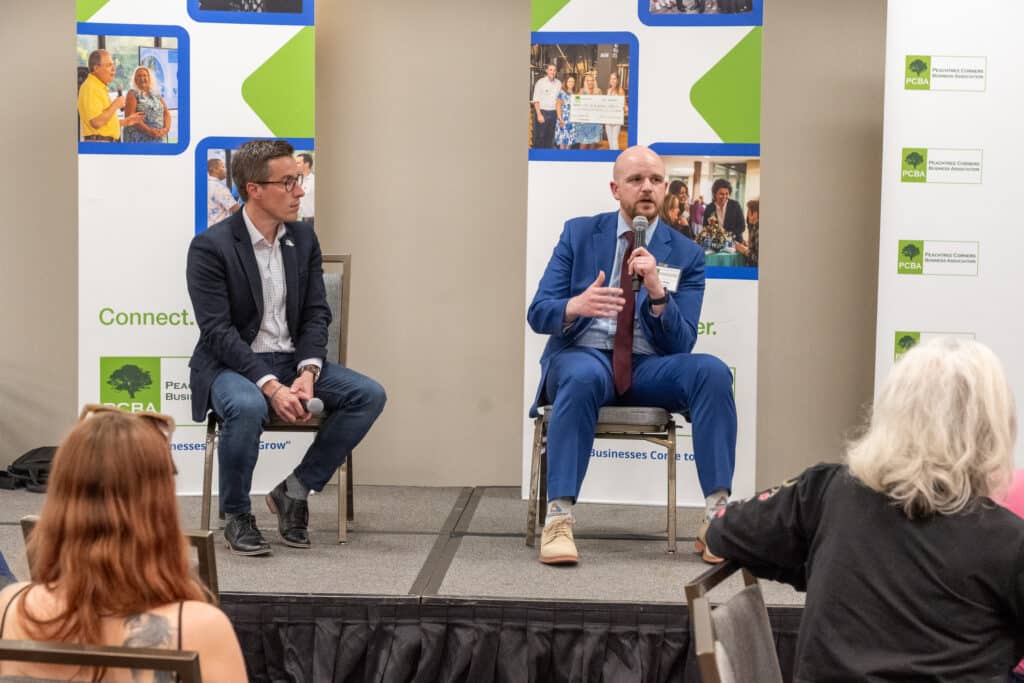
“One of the biggest things that we talk about that I’m sure it seems like most of us here, if you live here, you work here, you understand it. It’s the diversity that exists here in Gwinnett,” he said. “With a diversity index of 85, that means if we walk out of the Hilton here and we say hello to somebody, there’s an 85% chance they’re from a different ethnic or cultural background than ourselves, which to you and I may seem normal because that’s the life that we live in.”
He added that for companies, there’s a tremendous value in that, whether they have stated values, or they’re just making hiring decisions to get a wide range of candidates to fill those roles. Additionally, because of the proximity to Atlanta, Gwinnett County has a great labor draw.
Partnership Gwinnett
Partnership Gwinnett plays a significant role in recruiting businesses, expanding existing companies and developing the workforce. Hickey showed how the organization was involved with more than 24 projects last year.
“A majority of those were expansions, and that is a common thread you’ll see in economic development,” he said. “In business retention, expansion is so vital to working with our existing companies to make sure that they have the resources they need.”
He added that’s what leads to new investment and job creation in the community.
The organization also focuses on redevelopment projects, working with cities and the county to improve infrastructure and community amenities — especially strong educational institutions such Georgia Gwinnett College, Philadelphia College of Osteopathic Medicine and others.
Quality of life
In closing, both men stressed the importance of recruiting companies and developing the workforce, along with one aspect that means a lot but may not be as obvious — quality of life.
“It’s definitely evident that people like to work where they live — the whole live, work play experience,” said Hickey. “I joke that the part that people really have the most questions about, and are most excited to learn about, is new events at The Forum or Gwinnett Place Mall.”
Although they want to know what’s the next major company coming to Gwinnett, people REALLY want to know about how to spend their leisure time.
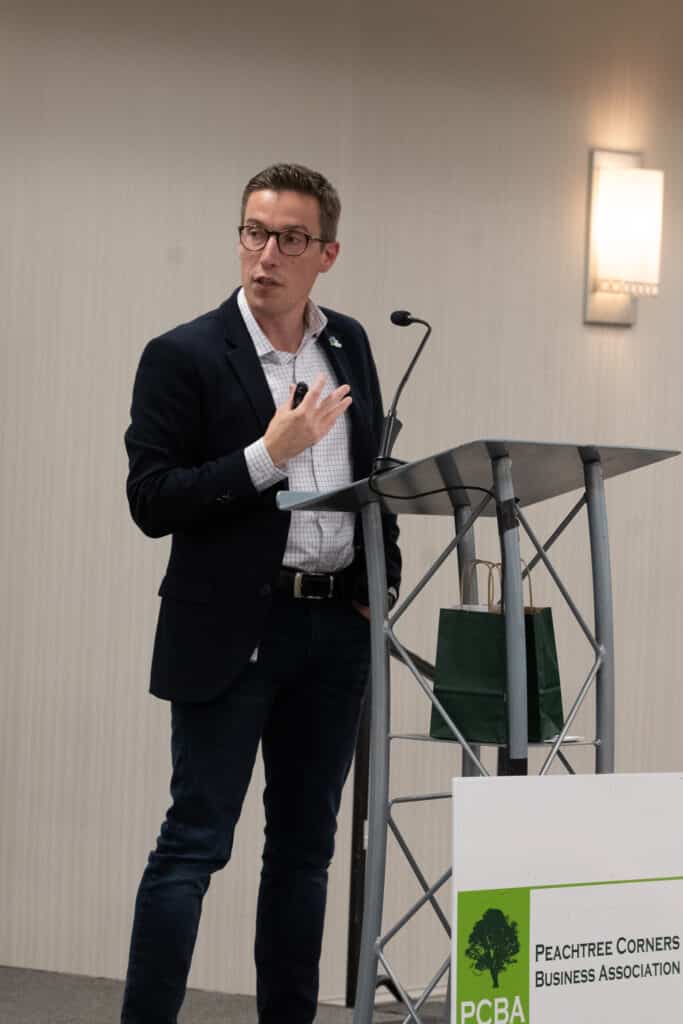
“That speaks to the importance of ensuring that we have a great community,” he said. “So at Partnership Gwinnett we work with all of our cities, and the county government as well, [on] a kind of a best-practices trip.”
He added that the peer tour allows everyone to know what the neighboring communities are doing and share the good news.
“We will take all of these elected officials, but also city staff, to different cities across the Southeast,” he said. “Last year, I believe they went to Huntsville, and have been to Greenville, Chattanooga — all cities that have done some really cool redevelopments that have taken their city to the next level. Our goal is to learn from them.”
Related
Read the Digital Edition
Subscribe
Keep Up With Peachtree Corners News
Join our mailing list to receive the latest news and updates from our team.
You have Successfully Subscribed!

From Boardrooms to the Himalayas: Vandana’s Journey to Purpose and Growing with Intention [Podcast]

Guardians of the Jukebox to Play the VoxStage on May 31

Music Matters Productions Expands Peachtree Corners Headquarters

Brandon Branham Honored for Transformative Leadership in Peachtree Corners

“Geek Culture” Shines at 2025 MomoCon

Celebration and Community: ICAGeorgia Wraps Up School Year with Two Festive Events

The PCBA Awards $500 to Light Up The Corners at After-Hours Event

Vox-Pop-Uli Launches RED Initiative for Veterans’ Support

Vox-Pop-Uli Launches RED Initiative for Veterans’ Support

The PCBA Awards $500 to Light Up The Corners at After-Hours Event

“Geek Culture” Shines at 2025 MomoCon

Celebration and Community: ICAGeorgia Wraps Up School Year with Two Festive Events

Guardians of the Jukebox to Play the VoxStage on May 31

Music Matters Productions Expands Peachtree Corners Headquarters

Brandon Branham Honored for Transformative Leadership in Peachtree Corners

From Boardrooms to the Himalayas: Vandana’s Journey to Purpose and Growing with Intention [Podcast]

Light up the Corners [Video]

Capitalist Sage: Business Leadership in Your Community [Podcast]

Cliff Bramble: A Culinary Adventure through Italy

Top 10 Brunch Places in Gwinnett County

A Hunger for Hospitality

THE CORNERS EPISODE 3 – BLAXICAN PART 1

Top 10 Indoor Things To Do This Winter

The ED Hour: What it takes to Remove Barriers from Education








